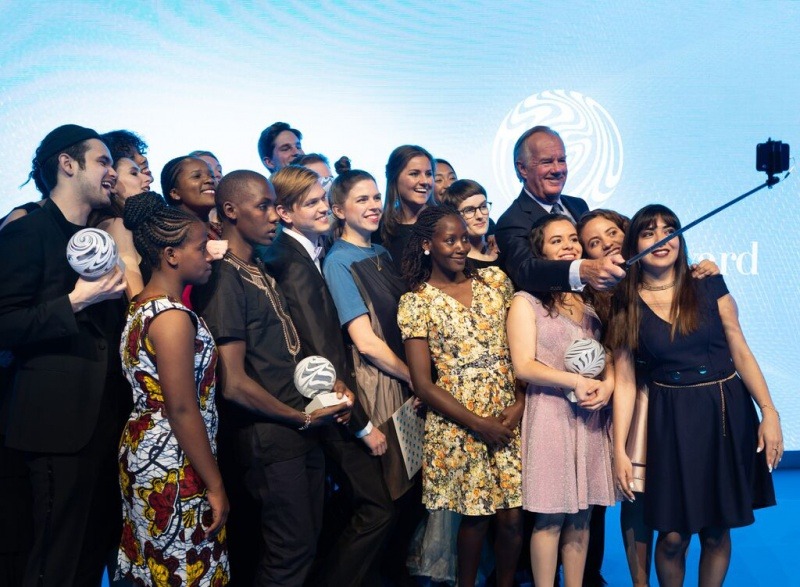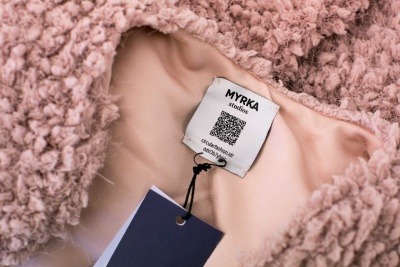Five innovative companies turning fashion circular

Five sustainable fashion innovations have won a share of €1 million (£857,900) in H&M’s Global Change Award 2019.
While major brands are being singled out for failing to improve their sustainability, the Global Change Award supports ‘tomorrow’s game-changers’ – new ideas to make the fashion industry more environmentally friendly. With the concept of the circular economy gaining traction in the clothing industry, these innovators are developing new materials and technology to keep textiles in use for as long as possible, and make sure they are easy to recycle at the end of their life.
The five winners for 2019 were announced on 4 April, whittled down from 6,640 entries from across 182 countries. As well as a financial prize, all winners will receive access to a one-year international accelerator programme provided by H&M Foundation.
The Global Change Award 2019 winners
 circular.fashion's scannable circular ID
Image: presstigieux
Circular.fashion - Circular design software
circular.fashion's scannable circular ID
Image: presstigieux
Circular.fashion - Circular design software

Taking home €300,000 (£257,000), German company circular.fashion was commended for its use of technology as a means of reducing waste. The start-up has developed a digital system that fashion brands can use to make their products as circular as possible. A vast database provides information to producers about the most sustainable and easily recyclable materials, along with guidelines on how to design clothes to be easy to take apart for recycling at end of life.
circular.fashion has also developed a unique ‘circularity ID’, which can be sewn onto garments for consumers to scan and see the history and lifecycle of their item. The company says that the ID will be identifiable at sorting facilities, further improving ease of recycling.
dimpora – Eco outdoor wear
Dimpora has developed a biodegradable and mineral-based membrane for outdoor wear. The micro-thin membrane, called Sane Membrane, can be added to any material to keep it safe from the elements – and is free from perfluorocarbons (PFCs), a common chemical compound in water-repellent clothing that has been shown to accumulate in the natural environment and contribute to health problems. Dimpora’s membrane can also be used with biodegradable polymers, making a fabric that will have less of an impact at the end of its life. Dimpora won €250,000 (£214,600).
Green Nettle Textile – Organic fibres
This Kenyan company won €150,000 (£128,700) for its inspired use of stinging nettles as textile fibres. Given that nettles grow in abundance, turning them into organic fabric kills two birds with one stone – finding a use for a plant often considered a weed and providing new revenue streams for Kenyan farmers.
The Sustainable Sting project sees nettle plantations established in partnership with local communities on steep non-arable land. The nettle stalks can be turned into a linen-like fabric, while the leftover leaves and shoots are sent for use in cosmetics and nutrition.
 Petit Pli clothing that grows with the wearer
Petit Pli – Clothes that grow
Petit Pli clothing that grows with the wearer
Petit Pli – Clothes that grow

€150,000 was also awarded to Petit Pli, which makes children’s clothing with a difference. The material grows with the child – using a patent pending structure that enables the material to expand in two directions, remaining wearable for children between nine months and four years old, reducing the need for parents to go out and constantly replenish their child’s wardrobe.
Founder Ryan Mario Yasin said: “It’s an honour to have won a Global Change Award, it’s great to have that backing and recognition of Petit Pli’s solution… We will use the grant to support R&D and grow our interdisciplinary team of experts to take Petit Pli to the next level: putting it in the hands of parents worldwide, and making a tangible difference to the way we consume resources in the fashion industry.”
Read our interview Petit Pli's Ryan Mario Yasin.
Le Qara – Vegan leather
Finally, Peruvian company Le Qara was awarded €150,000 for its lab-grown vegan leather, which is derived from flowers and fruits, creating a completely biodegradable product that mimics the functions of real leather without the environmental impact of the leather industry.
Isemar Cruz Loayza commented: “The Global Change Award win means everything for our innovation, it is a once in a lifetime opportunity to get the training and exposure to succeed. Being from Peru it hasn’t always been easy to get funded, this grant takes our idea to market and will be used to build the initial production plant as well as managing production and distribution.”
All of the winners also have crowdfunding campaigns on Indiegogo. More information about the awards can be found on the Global Change Award website.








